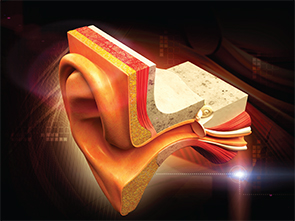Researchers have identified a new gene that may be associated with causing sensorineural hearing loss in childhood


Researchers have identified a new gene that may be associated with causing sensorineural hearing loss in childhood
The choice between MRI and CT will have to be determined by individual clinicians, based on their assessments of relative risks and benefits
The MCID can be a useful tool to evaluate and compare group outcomes

These studies demonstrate signicant benefit of bimodal stimulation over a single CI
Better AC thresholds were demonstrated with the VSB in the mid- to high frequencies; the functional gain with the VSB was also signicantly better

Initial radiographic evaluation in patients with unilateral PT can be challenging due to the many causes as well as the questionable results of some of the imaging findings
In this study, the Nucleus Hybrid S8 provided improved word understanding in quiet and noise

Gadolinium contrast enhanced T1 weighted magnetic resonance imaging (GdT1W MRI) is the most widely accepted evaluation for asymmetric sensorineural hearing loss (ASNHL)


A new computer program may be able to predict which children with hearing loss treated with cochlear implants will develop effective language skills after implantation.